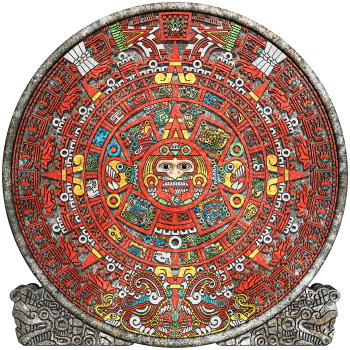There will be scarcities of corn and squash during this katun and this will lead to great mortality. This was the katun during which the settlement of Chichen Itza occurred, when the man-god Kukulcan (Quetzalcoatl) arrived. It is the katun of remembering and recording knowledge.
Katun 4 (1993-2012) of the Mayan Calendar as prophesied by Chilam BalamFor half there will be food, for others misfortunes. A time of the end of the word of God. A time for uniting for a cause.
Katun 2 (2012-2032) of the Mayan Calendar as prophesied by Chilam Balam
Tag: imperialism
Apr 12 2009
Dystopia 6: The Enemy
Mar 22 2009
Dystopia 5: Lost
“And hundreds of thousands of simple, kindly folk torn from their wives, mothers, and children, and with murderous weapons in their hands will trudge where ever they may be driven, stifling the despair in their soles by songs, debauchery, and vodka. They will march, freeze, suffer from hunger and fall ill. Some will die of disease, and some will at last come to the place where men will kill them by the thousands. And they too, without themselves knowing why, will murder thousands of others, whom they have never yet before seen and whom have neither done nor could do them any wrong.” From Christianity and Patriotism By Leo Tolstoy Author of War and Peace
Nov 24 2008
Kenya
When future historioranters analyze the data from this past election, at least one thing will be abundantly clear: of all the nations in Africa, Kenya played the largest role in America’s 2008 electoral process. It hadn’t been expected to be so – the odds were on perennial favorites like Egypt, South Africa, the still un-interdicted Sudanese Genocide, or that nutjob in Zimbabwe – but there Kenya was, looming like Kilimanjaro over the Serengeti. And I mean over all the Serengeti: not only does the President-Elect have a close connection with the nation – Sarah Palin’s Witch Doctor is Kenyan by birth.
Join me, if you will, in the Cave of the Moonbat, where tonight we’ll contemplate a land that’s seen everything from the Dawn of Humanity to becostumed imperialists to a sad-but-all-too-typical history of governance since the Era of Decolonization. Maybe along the way, we’ll come to know a little more about the most famous Kenyan-American of all – a guy who even now seems to be operating by that old African proverb, “Just because he harmed your goat, do not go out and kill his bull.”
Sep 20 2008
No to coups! No to U.S. Imperialism! – HOV London organises protests
Original article, by Niklas Albin Svensson , vial Socialist Appeal (UK):
Yesterday John McDonnell MP explained why US imperialism is so concerned about developments in Bolivia and Venezuela: “What the US is terrified of is the prospect that socialism will catch light all across the Americas, so of course it has to go on the attack. But it is exactly for this moment that solidarity campaigns exist.” He explained that, “what is happening is not a personal attack on Morales or Chavez but an attack on the seeds of socialism that they are spreading.”
Aug 24 2008
Imperialism’s unstable world order
Original Article, sub-headed After seven days of bloody war in the Caucasus and growing tension between the US and Russia, John Rees asks what is it about the new world order that has made it so prone to warfare?, via socialistworker.org.uk:
There is one fundamental thing that is common to capitalism in every age that makes it a uniquely violent system. It is not a marginal or accidental part of the system but something that is part of the very definition of capitalist society. That thing is competition.
Uh-oh! Competition being bashed…must restrain from shouting ‘USA, USA, USA.’ After all, isn’t our competitive spirit what made us greater than everybody else? Isn’t competition what makes our ‘free market’ system of capitalism work so well?
Aug 23 2008
Democrats and Obama prepare platform of war and reaction
Original article, by Bill Van Auken, via wsws.org (World Socialist Website):
With the Democratic National Convention set to convene in Denver, Colorado next week for the formal nomination of Senator Barack Obama, the party and its presidential candidate have made it clear that they will present no genuine alternative to the politics of aggressive war and social reaction that have prevailed in America over the whole past period.
Aug 04 2008
The Annotated White Man’s Burden
In February, 1899, Rudyard Kipling, poet laureate of British imperialism, published in McClure’s Magazine a poem for an American audience. In it, Kipling hailed the brash new imperialists on the block, congratulated us on our recent conquests, and – even as the sun was setting on Victoria’s Age – let would-be 20th-century colonialists know what was in store for those who chose to meet their racial obligations by lifting the unfortunate brown folk out of the mire.
Well, Ruddy, you’ll be pleased to know that we’ve finally taken your advice and shouldered the burden. Join me, if you will, in the Cave of the Moonbat, where tonight your resident historiorantologist marks his return from life-duties-related exile with a recitation of this old chestnut – and a hearty round of thanks to Mr. Kipling. After all, without The White Man’s Burden to guide us, we might never have seen any of this coming…
Jul 26 2008
Real News: Iraq Events Moving Out Of US Control
July 21, 2008, 8 min 46 sec: Iraq events moving out of US control
Sabah al-Nasseri: Washington cannot dictate politics in Iraq
Sabah al-Nasseri: “They are instrumentalizing the internal resistance within the Iraqi Parliament, within the Iraqi societies, against the United States, against the presence of US troops in Iraq, and so on, to actually negotiate new deals concerning securities agreement, oil agreement, etcetera, by saying, “Look, we cannot signs all of these kind of agreements. Otherwise we’ll commit political suicide.”
Born in Basra, Iraq, Sabah al-Nasseri is Professor of Political Science (Middle East Politics) at York University, Toronto. Prior to that he was a Lecturer of Political Science at the J.W. Goethe University, Frankfurt. Currently he is working on an article, “Understanding Iraq.”
Jul 21 2008
More Real News: US Foreign Policy, and The Geo-Politics of Oil
What’s a rational American foreign policy?
Aijaz Ahmad: Start with the question, why does the US have to be the most powerful country on earth?
The United States economy is stagnant and faces the possibility of a real Depression. Its currency has lost a quarter of its value on global markets in three years. No country in the entire history of humankind has ever owed as much money to foreigners as the US does today, and this debt rises by about a billion dollars a day. Its military expenditures are higher than those of the next twenty countries combined. It’s time to question basic assumptions about US foreign policy.
Mar 19 2008
Picture this: 69 Times the Number at Normandy
(As we stagger into year 6 of the war, it seems appropriate to re-post this diary from last April –BL)
A team of American and Iraqi epidemiologists estimates that 655,000 more people have died in Iraq since coalition forces arrived in March 2003 than would have died if the invasion had not occurred.
…
It is more than 20 times the estimate of 30,000 civilian deaths that President Bush gave in a speech in December. It is more than 10 times the estimate of roughly 50,000 civilian deaths made by the British-based Iraq Body Count research group.
…
(update)The survey was done by Iraqi physicians and overseen by epidemiologists at Johns Hopkins University’s Bloomberg School of Public Health
655,000 Iraqis are dead.
That’s a scary number. And a big number. I tried to comprehend how big it is, but my imagination failed me. What’s needed is a visual model that illustrates the enormity of the situation.
Jan 03 2008
Mexican Farmers Protest, But Nobody’s Listening

Harvesting Corn In Mexico By Hand
Dozens of Mexican farmers blocked a lane of the border bridge from Ciudad Juarez to El Paso for 36 hours to protest the removal of Mexico’s last tariffs on US and Canadian farm goods. The protest ended today.
Activists lifted a blockade at the U.S.-Mexico border on Wednesday, ending a 36-hour protest against the removal of Mexico’s last tariffs on U.S. and Canadian farm goods.
Mexico abolished its last protective tariffs on basic crops like corn, beans and sugar on Tuesday, under the terms of the North American Free Trade Agreement, or NAFTA. Mexican farmers have complained they won’t be able to compete with U.S. farmers who can sell cheaper products because they receive government subsidies.
Mexico’s Roman Catholic Church has warned that the changes could spark an exodus to the U.S.
“It is clear that many farmers will have a difficult time competing in the domestic market, and that could cause a large number of farmers to leave their farms,” the archdiocese said in a statement issued on New Year’s Day.
More across the Rio Pequeno.
Nov 14 2007
A Narrow History of Dollar Hegemony: Hudson’s Super Imperialism
(Crossposted at DailyKos.com)
Book review: Hudson, Michael. Super Imperialism.
Second edition. London: Pluto, 2003.
I thought that a discussion of Hudson’s book book would be pertinent in terms of recent discussions of indebtedness and in terms of Hudson’s role in the run-up to next year’s elections. Michael Hudson’s site says he is “President of the Institute for the Study of Long-Term Economic Trends (ISLET), A Wall Street Financial Analyst, Distinguished Research Professor of Economics at the University of Missouri, Kansas City and author of Super Imperialism: The Economic Strategy of American Empire (1972 and 2003) and of The Myth of Aid (1971).
In 2007, Dr. Hudson has been appointed Chief Economic Policy Adviser for the Kucinich for President campaign and is writing a new tax policy for the United States.


